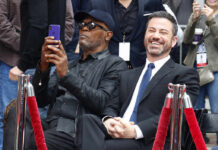
A jury’s decision to acquit a man for throwing a sandwich at a federal agent has sparked nationwide debate over the boundaries of free speech and protest.
Story Snapshot
- Sean Charles Dunn was acquitted after throwing a sandwich at a federal agent during a protest.
- The jury’s decision highlights potential First Amendment implications in protest cases.
- The case raises questions about the balance between protest rights and law enforcement authority.
- Dunn’s defense claimed the act was a harmless political gesture.
The Incident and Legal Proceedings
Sean Charles Dunn, a former Justice Department employee, made headlines after a video of him throwing a sandwich at a federal agent went viral. The incident occurred during President Trump’s law enforcement surge in Washington, D.C., a response to the civil unrest of summer 2020. Prosecutors charged Dunn, arguing his action constituted assault, while his defense insisted it was a symbolic political gesture protected under the First Amendment.
Initially, a grand jury declined to indict Dunn on a felony charge, leading to a misdemeanor trial. On November 6, 2025, a jury acquitted Dunn, finding him not guilty of assault. This case has drawn attention for its potential implications on the freedom of speech and expression, and the fine line between protest and criminal behavior.
Watch: Man who threw sandwich at federal agent in DC found not guilty of assault
Implications for Free Speech and Protest
The acquittal of Dunn is perceived by many as a victory for free speech advocates, reinforcing the right to engage in nonviolent protest. This verdict suggests that not all symbolic acts of protest should be criminalized, a stance that resonates with those who argue for limited government intervention in personal freedoms. However, law enforcement agencies might view the decision as undermining authority, complicating their efforts to maintain order during protests.
While the act of throwing a sandwich is unconventional, it underscores the ongoing debate over the boundaries of acceptable protest. Legal scholars may cite this case in future arguments regarding the limits of free speech and the appropriate response to civil disobedience, especially when protests take novel forms.
He Threw a Sandwich at a Federal Agent – Now a Jury Has Decided His Fate https://t.co/1Np97SuIOp
— DLW 🔥#MAGA (@Dlw20161950) November 6, 2025
Broader Context and Reactions
This case occurs in a politically charged atmosphere where protest actions, even symbolic ones, are under intense scrutiny. During the Trump administration’s “law and order” push, additional federal agents were deployed, leading to increased confrontations with protesters. Dunn’s case exemplifies the tensions between individual rights and state power, with the judiciary acting as the mediator.
Public reactions to the verdict are likely to be polarized. Free speech advocates celebrate the ruling as a triumph for expressive rights, while some law enforcement supporters express concern over maintaining public order. The case may inspire future protests, encouraging symbolic acts as a form of political expression.
Sources:
https://apnews.com/article/sandwich-throwing-trial-justice-department-a2776c568a1ea4b8ce5b6af606669b63
https://www.theguardian.com/us-news/2025/nov/06/man-threw-sandwich-agent-washington-not-guilty-verdict

























